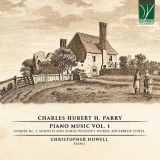Als Lehrer und später Direktor des Royal College of Music sowie mit Aufträgen für große Chorwerke blieb Charles Hubert Parry in der Hochphase seiner kompositorischen Tätigkeit wenig Zeit für Klavierwerke. Daher hören wir auf dieser Einspielung Frühwerke eines der Begründer der Renaissance englischer Musik im 19. Jahrhundert.
Der englische Pianist Christopher Howell, der sich intensiv mit der Musik britischer Komponisten auseinandersetzt, hat sich nun dran gemacht, die spärliche Klaviermusik von Parry integral einzuspielen.
Den Beginn macht die erste Sonate in F-Dur, die noch in romantischer Faktur daherkommt, mit Anklängen an Schumann und Schubert. Howell verleiht diesem Werk dennoch eine eher typisch britische Noblesse mit verträumten melodischen Bögen im Andante und einem frisch und brillant musizierten Finalsatz.
Bei den Sonnets and Songs Without Words und den Shulbrede Tunes erleben wir die für jene Zeit prägenden Rückgriffe auf die Volksmusik. Howell lebt diese Charakteristika voll aus, spielt mit Lebensfreude, charmant pointiert – insbesondere in den zehn Shulbrede Tunes, die er mit impressionistischen Klangfarben sehr kontrastreich gestaltet.
As a teacher and later director of the Royal College of Music, and with commissions for large choral works, Charles Hubert Parry had little time for piano works during the peak of his compositional activity. Therefore, on this recording we hear early works by one of the founders of the Renaissance of English music in the 19th century.
The English pianist Christopher Howell, who has made an intensive study of the music of British composers, has now set about integrally recording Parry’s sparse piano music.
It begins with the first sonata in F major, still in Romantic manner, with echoes of Schumann and Schubert. Howell nevertheless imbues this work with a rather typically British nobility, with dreamy melodic arches in the Andante and a freshly and brilliantly played final movement.
In the Sonnets and Songs Without Words and the Shulbrede Tunes we experience the recourse to folk music that was characteristic of the period. Howell lives these characteristics to the full, plays with joie de vivre, charmingly pointed – especially in the ten Shulbrede Tunes, which he shapes with impressionistic timbres very rich in contrast.






















